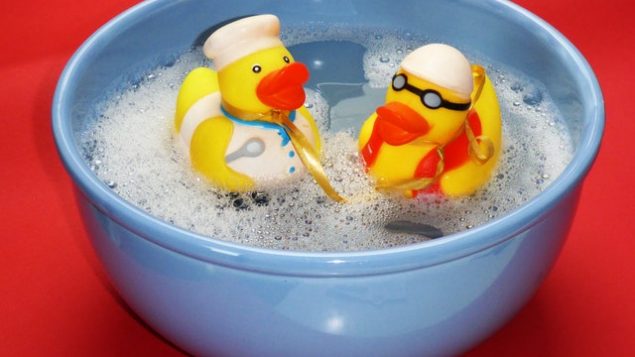A recent study about bacteria in bath toys should not alarm parents unduly, says Lori Burrows, a researcher in infection diseases and professor at McMaster University. The Swiss study found that bacteria can form inside rubber duckies and other bath toys that have holes in them and admit water.

Bacteria in bath toys are not a major concern for children over the age of one, says Prof. Lori Burrows.
Only ‘mild’ concern on the part of specialist
“I don’t think that these are a major concern for older children especially because their immune systems are pretty well-developed by the time they get older. So…having a little bit of dirty water splash in their face or swallowing a bit of dirty water is not going to hurt them,” says Burrows.
“I would be mildly concerned if I had very young children because their immune systems still are not well-developed and so you really don’t want little babies for example to get a big blast of bacteria in their eyes from your ‘yucky ducky.’”
Children under one year old have immune systems that are still developing and are less able to defend against bacteria. Burrows suggest that for them, parents may want to buy solid bath toys with no holes that can accumulate water and bacteria.

Cutting boards must be kept clean so that bacteria from meat do not come into contact with fruit, vegetables or other foods that will not be cooked.
Kitchen requires some care
Concern about bacteria in a normal, tidy Canadian household mostly centres in the kitchen where cloths and sponges used to clean dishes and surfaces can stay damp and accumulate food, allowing bacteria to grow. Burrows said these materials can be cleaned by putting them in the dishwasher or washing machine, or they can simply be thrown out.
It is also important to clean anything that comes into contact with raw meat as that can harbour harmful bacteria. For example, if meat contacts a cutting board and them contacts fruit or vegetables that will not be cooked there could be cross-contamination causing illness.
Burrows adds it is always important to wash one’s hands after using the bathroom.

Washing hands is important to avoid contamination with fecal bacteria as well as viruses and other agents that can make people sick.
Killing all bacteria ‘not a good idea’
But beyond these precautions, it can be harmful to declare war on bacteria at home. “Honestly, there are bacteria all around us all the time. And humans themselves are covered in bacteria, we have bacteria in our guts and these are helpful bacteria. So, we don’t want to encourage killing all bacteria because that’s not a good idea. We actually need these bacteria. They’re good for our health.”
Allergies, super-bugs linked to war on bacteria
In fact, some studies suggest a link between overly clean environments and an increased incidence of allergies and asthma. And overuse of anti-microbial products can result in the growth of super-bugs or resistant bacteria.
So, Burrows suggests healthy Canadians limit their routine action against bacteria to washing their hands and taking care in the kitchen. Then further care should be taken to limit exposure for the very young and those with suppressed immune systems.







For reasons beyond our control, and for an undetermined period of time, our comment section is now closed. However, our social networks remain open to your contributions.